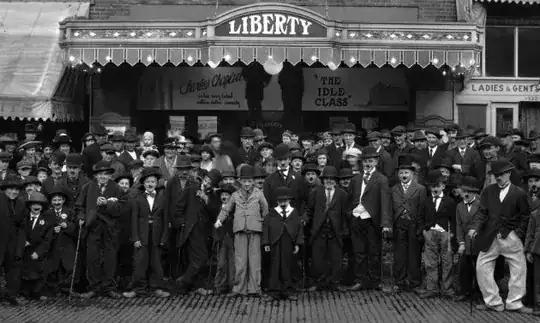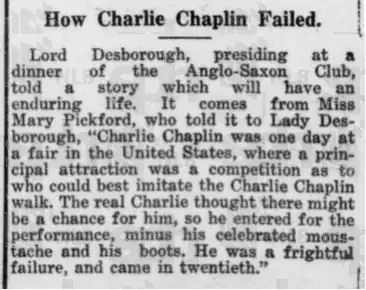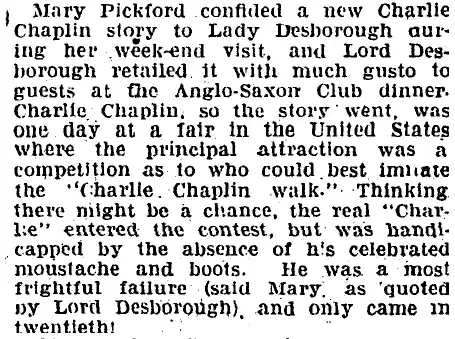I heard this several times, is it really true or just a joke/rumor?
The claim is, that "Charlie Chaplin once only came second in a Charlie Chaplin look-alike contest".
I heard this several times, is it really true or just a joke/rumor?
The claim is, that "Charlie Chaplin once only came second in a Charlie Chaplin look-alike contest".
Update: Possibly?
Thanks to @alan-boisvert the passage that the Association Chaplin referred to in the book My Father, Charlie Chaplin does exist:
Dad told me about one of these that had taken place before I was born. It was at Grauman's Chinese Theatre in Hollywood, and there were thirty or forty people on the stage doing their best to imitate Dad. Dad was one of them. He'd gone up incognito to see how he would fare. He came in third. Dad always thought this one of the funniest jokes imaginable—whether on him or the judges or both, I don't know.
I'd argue that this is still an anecdotal claim, told decades after the fact. But it does have significantly more precise detail than some of the other published examples of the claim. So, whether or not this happened depends on whether or not you believe the story a father told his son.
 “Charlie Chaplin Look-Alike Contest” by J. W. Sandison, November 5, 1921
“Charlie Chaplin Look-Alike Contest” by J. W. Sandison, November 5, 1921
This is a myth that has been around for a long time, but there is no direct record of it happening, and all of the claims are anecdotal. As far as I can tell, Charlie himself never admitted this, and his son didn't mention it in the book he wrote about his father. I emailed the Association Chaplin and got a response:
... The only real reference I have ever seen to this story is in English newspaper clippings from 1918, when Mary Pickford was in London at an Anglo Saxon Club dinner, and told a story to Lord Desborough who repeated it to the press that Charles Chaplin entered a Chaplin walk contest at a fair in the US and came in 20th.
This anecdote told by Lord Desborough, whoever he may have been, was quite widely reported in the British press at the time.
There are no other references to such a competition in any other press clipping albums that I have seen so I can only assume that this is the source of that rumour, urban myth, whatever it is.
However, it may be true.
I also scribbled on a piece of paper a note to myself a while back that Charles Chaplin Jr mentions the competition in his book called My Father... but I have been unable to find the reference again in that book...(!)
Mary Pickford was a popular actor at the time and a good friend of Charlies. Unfortunately this story has an "I know a person who knows a person who says..." smell about it. I managed to track down some newspaper articles which are simple rewordings of the same gossip story:
Singapore's The Straits Times, 10 Aug 1920, "How Charlie Chaplin Failed":

And another version of the same story from the Poverty Bay Herald (NZ), also in 1920:

And another from the 23 March 1921 Albany Advertiser (Australia):
A competition in Charlie Chaplin impersonations was held in California recently. There was something like 40 competitors, and Charlie Chaplin, as a joke, entered the contest under an assumed name. He impersonated his well known film self. But he did not win; he was 27th in the competition.
These examples are all of 1920s gossip columns - simple retellings of a story that was spreading virally at the time. These early versions of the myth all also share many similarities with the Association Chaplin retelling. I'm unsure of the location of this Anglo-Saxon club based on any of the articles, and they're also sparse on details (in different ways) on Charlie Chaplin's supposed competition loss. I would say that it's unlikely that any of these particular retellings are true in any way.
I have personally read the "My Father" book, while researching this question, and there's no mention of any kind of impersonation or walk contests, even in passing. I paid particular attention to the 1915-1922 period that most of the claims fall into. Edit: The claim from the book has been identified.
It's most likely that this story was completely made up, using Mary Pickford's name to lend credibility ('a friend of Mary Pickford's who is friends with Charlie says that...') and spread through gossip columns the world over throughout the following months and years.
I find it amazing that despite the wildly varying dates and locations that these retellings state, and the lack of specific dates, times and locations ("a fair in the United States") within the claims, the myth has still survived for almost 100 years.
Snopes has a good page on this:
Chaplin did indeed fare poorly in a Chaplin look-alike contest, but the competition took place in a San Francisco theater. His final standing is not recorded, although it was noted that he "failed even to make the finals." Chaplin told a reporter at this time that he was "tempted to give lessons in the Chaplin walk, out of pity as well as in the desire to see the thing done correctly."
The sources listed on the Snopes page are:
Chicago Herald. 15 July 1915.
The relevant quote from the book is:
Vaudeville houses still showed motion pictures in 1915, and many were promoting the Chaplin vogue by sponsoring amateur Charlie look-alike contests. Among the early winners was Bob Hope, who took first prize in a Chaplin contest in Cleveland. Charlie himself was not so lucky. When he entered a contest run by a theater in San Fransisco, he failed even to make the finals. "I am tempted to give lessons in the Chaplin walk" he told a reporter, "out of pity as well as in the desire to see the thing done correctly".
The only citation listed for this passage in the book is the very same Chicago Herald for July 15, 1915, Vol. 11, RLC.
I am unable to verify the second reference at present, as I am unable to find any archive online for the Chicago Herald, which seemed to only exist under that name for four years. Short of going to a library with access to the archive there does not seem to be a way to verify this reference.
Edit: This answer records that the article could not be found.
I have a copy of the book My Father, Charlie Chaplin by Charles Chaplin Jr. (1925-1968).
In it he describes the incident on page 203:
They held countless Charlie Chaplin contests. Dad told me about one of these that had taken place before I was born. It was at Grauman's Chinese Theatre in Hollywood, and there were thirty or forty people on the stage doing their best to imitate Dad. Dad was one of them. He'd gone up incognito to see how he would fare. He came in third. Dad always thought this one of the funniest jokes imaginable—whether on him or the judges or both, I don't know.
There is a note on this in the Wikipedia article for Charlie Chaplin in the Legacy section
http://en.wikipedia.org/wiki/Charlie_Chaplin#Legacy
Chaplin's "tramp" character is possibly the most imitated on all levels of entertainment. Chaplin once entered a "Chaplin look-alike" competition and did not make the final round.[198][199]
The article also referenced Snopes.com, but they also referenced Howell, Melissa; Howell, Greg; Pierce, Seth (1 August 2010). Fusion: Where You and God Connect. Review and Herald Pub Assoc. p. 275. ISBN 978-0-8280-2547-8. Retrieved 23 March 2011.